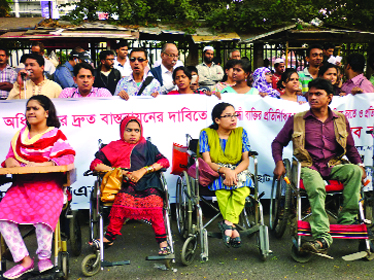
Published On:2016-01-01 12:00:00
Training and Orientation
Training project on Primary Eye Care:
Eye care services are virtually absent in rural communities and upazila levels as primary eye care is yet to be developed in the country. There are 141 secondary hospitals (50% in the government, 40% in the NGOs and 10% in the private sector) that provide eye care in the country. The ophthalmic education training facilities have been developed so far to cater to the needs of the doctors mainly; not much for the mid level eye care professionals, such as nurses, optometrists, opticians, paramedics, program managers, etc.
Given the first line of contact, the informal care providers especially the traditional healers, village doctors and community health care providers can play pivotal role in healthcare services including eye-care support to village people.
In the above context, faith Bangladesh, Orbis International and icddr,b joined in a collaborative effort on a pilot basis to train 200 Rural Medical Practitioners and help improve primary eye-care services to the community. This joint initiative is known as “Training on Integrated Primary Eye Care Approach for Rural Medical Practitioners".
In total 207 (more than the project target) RMPs attended the training from 47 districts covering all divisions of Bangladesh. (IMAGE MAP)
At the end of the course, all participants were given a questionnaire framed with statements in ‘Likert Scale’. They were asked to complete the questions framed on 5-item Likert Scale, with 1 representing ‘Strongly Disgreed, 2 ‘Disagreed', 3 ‘Confused’, 4 ‘Agreed’, 5 ‘Strongly Agreed’.
The analysis revealed the following results:
|
Questions |
Strongly Agreed |
Agreed |
Confused |
Disagreed |
Strongly Disagreed |
|
Course contents were relevant |
94% |
5% |
1% |
- |
- |
|
Course methods were effective |
91% |
9% |
- |
- |
- |
|
Course materials were helpful |
91% |
9% |
- |
- |
- |
|
Course objectives were met |
82% |
15% |
3% |
- |
- |
|
The course will be useful in the workplace |
86% |
14% |
- |
- |
- |
|
Training facilities (such as classrooms, hospital, etc.) were excellent |
86% |
12% |
2% |
- |
- |
|
Overall the course was excellent |
89% |
11% |
- |
- |
- |
It was evident from the above results that the training course was highly relevant (94%), the training methods were highly effective (91%), the course materials were highly satisfactory (91%), and the training met the expectations of the majority participants (82%). Overall, in the opinion of the participants, the training course was excellent.
Students Field Experience:
We are in a MoU with Brown University, USA to provide mentoring and administrative support to the students visiting Bangladesh from the University under the Minority Health and Health Disparities International Research Training (MHIRT) Program. Last year, a Pre-med student, Mr. Joshua Remland was placed at faith Bangladesh and he gathered field experience especially on global and Bangladesh perspective of Autism Spectrum Disorder.
IMAGE OF JOSH
Professional Training
Training of Trainers (ToT) for Health Professionals and Managers:
We organize and conduct ToT once in a year. So far we have been able to build capacity of 40 professionals from 10 different organizations.
Training on Sensory Processing and Sensory Integration: Understanding and Using the Perspective.
Children and adults with autism spectrum disorder (ASD) as well as those with other developmental disabilities often have sensory integration difficulties which may affect their ability to attend and learn, move about and do things in a coordinated and well organized way, manage emotions and interpersonal relationships, respond to and behave in a way that others expect. Unfortunately, we, as a community of professionals and allied persons, still do not have that kind of understanding for sensory integration, let alone the other people in the society. Considering the imporatnce, faith Bangladesh has joined hands with icddr,b to organize and conduct this noteworthy training program.
This training will be continued on February 5-6, 2017 and the target participants are Medical Doctors, Special Educators, Speech and Language Therapists and allied professionals engaged in special child care. The expected number of participants to be trained is 30.
Sensory Integration Intervention (SII) for Children with Developmental Disabilities (February 7- 8, 2017)
It is estimated that 60 to 70 percent of children with ASD present with sensory modulation/processing disorder. Sensory overload can present itself in many ways, such as challenging behaviour, withdrawal and complete shutdown. There are, though, a number of simple strategies that can be used at home or classroom to effectively add the sensory filters; Occupational therapists are the key to this intervention. Adding the right interventions to target each sensory system helps the child’s nervous system become more organized and therefore assists the child to improve performance.
This training will be continued on February 7-8, 2017 and the target participants are Bachelors in Occupational Therapy. The expected number of participants to be trained is 20.
Workshop on Managing children with behavioural problems at home applying Sensory Integration
Many aspects of home and family life may be affected when living with a child with behavioural problems; and parents feel the most how hectic and chaotic it can be at home. Applying sensory integration activities efficiently at home would help parents/caregivers to manage their child’s behaviour.
This workshop will be conducted on February 9, 2017 and the target participants are parents and caregivers of special children. The expected number of participants to be trained is 100.
Technical Assistance to agencies/institutions/organizations:
In 2015 faith Bangladesh provided assistance to Orbis International to build partners' Leadership.
News & Events

Course Duration :
প্রতিবন্ধীদের উন্নয়নে চাই পৃথক অধিদফতরমানববন্ধনে বক্তাদের দাবি
Location :
প্রতিবন্ধী ব্যক্তিদের উন্নয়নে একটি অধিদফতর চালুর দাবি জানিয়েছে প্রতিবন্ধী সংশ্লিষ্ট একটি সংগঠনের নেতৃবৃন্দ। তারা বলেছেন, নারীর প্রতিনিধিত্ব যেমন পুরুষ করতে পারে না; তেমনি প্রতিবন্ধী ব্যক্তির প্রতিনিধিত্ব অপ্রতিবন্ধী কোন ব্যক্তি করতে পারে না। প্রতিনিধিত্বের ক্ষেত্রে সবখানে অপ্রতিবন্ধী ব্যক্তির অবস্থানের ফলে প্রতিবন্ধী ব্যক্তিরা সুযোগ পাচ্ছে না বলেও অভিযোগ করেন তারা।

